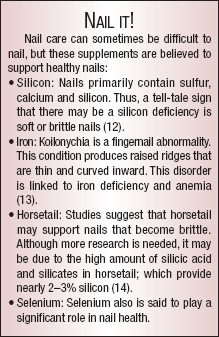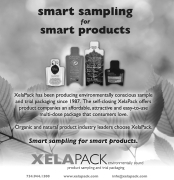There is no denying that everyone wants to look their best; how our skin, hair and nails look on the outside is a direct indication of what’s going on inside of our bodies. Fortunately, we can do our part to contribute to beauty by eating healthy and taking supplements that may promote beautiful skin, flowing hair and strong healthy nails.
Supplements and Skin
It’s no secret that a key to great-looking skin is toprotect it from the sun, use moisturizers and avoid stress and smoking. Now, add one more to this list: supplementation. Of the many supplements on the market that can support skin vitality, one important choice is hyaluronic acid (HA). Hyaluronic acid is naturally present within the body and is a major component of connective tissues such as in the eyes, skin, cartilage and joints. However, its main role in the body is to lubricate joints; it is also a natural support structure of the dermis. With respect to skin, hyaluronic acid fills the space between collagen and elastin fibers, delivering nutrients, hydrating skin by trapping water and acting as a cushioning agent (1).
Says Nicholas Perricone, M.D., “Unfortunately, levels of this critical nutrient decline greatly with age” (1). “By the time we reach 50 years of age, our bodies are producing about 50 percent less hyaluronic acid than they did in youth. This decline is a major contributing factor to joint ailments, such as arthritis, as well as wrinkled, sagging skin,” he states (1). Recently, the U.S. Food and Drug Administration approved hyaluronic acid for cosmetic applications (injected in gel form and acts as a filler which removes wrinkles) (1). But, supplementation is an even better option for those who want to support skin health naturally.
In most people, growing older may cause collagen and elastin (proteins) to become depleted (2). Collagen is the most plentiful protein that exists in the human body, and it forms a strong support structure for the skin, internal organs, cartilage and bones, and the connective tissue in between (3). What does collagen do for the skin? Collagen fibers give the skin its firmness by creating a protein matrix. A decrease in these vital proteins further reduces plumping (moisturizing). Thus, the collagen fibers become flaccid and fibrous, which causes the thinning epidermis to go limp, resulting in wrinkles and fine lines. Over time, collagen fibers harden, the elastic tissue decreases, and sagging, wrinkled skin appears (2). Replenishing collagen supplies with a natural supplement can help skin look great.
plentiful protein that exists in the human body, and it forms a strong support structure for the skin, internal organs, cartilage and bones, and the connective tissue in between (3). What does collagen do for the skin? Collagen fibers give the skin its firmness by creating a protein matrix. A decrease in these vital proteins further reduces plumping (moisturizing). Thus, the collagen fibers become flaccid and fibrous, which causes the thinning epidermis to go limp, resulting in wrinkles and fine lines. Over time, collagen fibers harden, the elastic tissue decreases, and sagging, wrinkled skin appears (2). Replenishing collagen supplies with a natural supplement can help skin look great.
Coenzyme Q10 (CoQ10 or ubiquinone) also can prove beneficial for those with aging skin. It is, in fact, a nutrient that helps regulate energy production in cells (4). Studies have shown reduction in fine wrinkles around the eyes of those who take coenzyme Q10, while other tests show that slathering on coenzyme Q10 before direct exposure to sunlight may protect against often-harmful damage from UV exposure (4). And, small-animal studies show that, “coenzyme Q10 supplementation attenuates the age-related increase in DNA damage (5).” This finding proves noteworthy because one’s chances of developing age-related DNA damage decreases with the use of coenzyme Q10.
One possible reason coenzyme Q10 may delay the aging process is because it functions as an antioxidant (counteracts the damaging effects of oxidation). Interestingly, scientists believe free radicals contribute to the aging process, and the onset of a plethora of health problems, including heart disease and cancer. It is believed that, “Antioxidants, such as CoQ10, can neutralize free radicals and may reduce or even help prevent some of the damage they cause (6).”
Those who don’t have enough coenzyme Q10 in their systems have a reduced ability to make collagen and elastin, which are needed for plump, healthy-looking skin.
It’s a Hair Affair
Our society is obsessed with hair, particularly how to grow it and make it look more lustrous. And, a healthy diet along with supplementation may help on the hair front. Evidence suggests that biotin (vitamin H) can rejuvenate brittle,  splitting or thinning hair, which can indicate a biotin deficiency (7). And, considered part of the B-complex group of vitamins, biotin is essential for healthy eyes, hair, liver and skin. What’s more, biotin is so effective that it is used along with zinc and other ingredients to fight alopecia in adults and children. Biotin is required by all organisms, but can be synthesized by only algae, yeasts, bacteria, molds and various plant species (8). Therefore, supplements are important.
splitting or thinning hair, which can indicate a biotin deficiency (7). And, considered part of the B-complex group of vitamins, biotin is essential for healthy eyes, hair, liver and skin. What’s more, biotin is so effective that it is used along with zinc and other ingredients to fight alopecia in adults and children. Biotin is required by all organisms, but can be synthesized by only algae, yeasts, bacteria, molds and various plant species (8). Therefore, supplements are important.
Omega-3 fatty acids (like alpha linolenic acid [ALA], eicosapentaenoic acid [EPA] and docosahexaenoic acid [DHA]), also can support skin and hair health. EPA/DHA-rich fish oil helps maintain the hair’s luster and provides nourishment to the hair follicles (9). Some believe that this property may aid in faster hair growth, thus thwarting hair loss. However, an abundance of proteins also is vital for hair growth. Since most fish varieties are rich in protein, eating fish helps in keeping healthy hair (10). Says Samantha Heller, M.S., R.D., a nutritionist at NYU Medical Center, “I believe there are many people who may have a sub-clinical lack of omega-3 fatty acids—these are ‘good’ fats, which have anti-inflammatory properties and may actually play a role in healthy hair” (9).
Many people do not associate vitamins A, C, D and E with healthy, full hair. But, vitamin A may regulate the synthesis of retinoic acid in hair follicles, thereby promoting growth (11). Vitamin C can help the body absorb iron, which is needed for hair growth. Vitamin D supports the stoppage of hair loss by stimulating the hair follicle and the cells that form the hair shaft. And, vitamin E builds capillaries in the body, which is believed to improve blood flow to the scalp, which can also cause the hair to grow. Be advised that though foods contain bioavailable vitamins, by adding additional supplements to the diet, it increases the nutrition available in the blood stream, which may stimulate hair growth (11).WF
References
1. L. Turner, “Say Hello to Hyaluronic Acid,” Better Nutrition, www.betternutrition.com/hyaluroniaacid- dermatology-glycosaminoglycang/supplements /checkout/875, accessed September 13, 2010.
2. A.L. Gittleman, The Living Beauty Detox Program (HarperOne, San Francisco, CA, 2000).
3. University of Wisconsin-Madison, “Scientists Create Super-Strong Collagen,” press release distributed Jan. 13, 2010, ScienceDaily, accessed September 23, 2010.
4. Mayo Foundation for Medical Education and Research, “Wrinkle Creams: Your Guide to Younger Looking Skin,” www.mayoclinic.com/health/wrinkle-creams/ SN00010, accessed September 23, 2010.
5. Linus Pauling Institute, “Coenzyme Q10” http://lpi.oregonstate.edu/infocenter/othernuts/coq10/i ndex.html, accessed September 23, 2010.
6. University of Maryland Medical Center, “Coenzyme Q10,” coenzyme-q10-000295.htm, accessed September 23, 2010.www.umm.edu/altmed/articles/
7. K. Williams, “Beautifying Your Coiffure,” 32 (7), 41 (2009), www.wholefoodsmagazine.com/ hbc/features/beautifying-your-coiffure, accessed September 23, 2010.
8. Linus Pauling Institute, “Biotin,” http://lpi.oregonstate. edu/infocenter/vitamins/biotin/, accessed September 23, 2010.
9. “Treat ing Hair Loss Natural ly,” www.webmd.com/skin-problems-and-treatments/ hair-loss/features/treating-hair-loss-naturally, accessed September 28, 2010.
10. “Health Benefits of Fish Oil,” www.organicfacts. net/organic-animal-products/organic-fish/ health-benefits-of-fish-oil.html, accessed September 28, 2010.
11. M. Grimers, “Vitamins Prevent Hair Loss: Vitamin A, B, C, D, and Vitamin E,” Natural News Network, June 18, 2010, www.naturalnews.com/029018_hair_loss_vitamins.html, accessed September 28, 2010.
12. Life Extension Foundation, “Silicon: An Overlooked Trace Mineral ,” Apri l 2003, www.lef.org/magazine/mag2003/apr2003_report_silicon_ 01.html, accessed September 28, 2010.
13. U.S. National Library of Medicine, “Nail Abnormalities,” www.nlm.nih.gov/medlineplus/ency/ article/003247.htm, accessed September 28, 2010.
14. PCC Natural Markets, “Horsetail,”www.pccnaturalmarkets. com/health/nutritional-supplement/horsetail/~ default, accessed September 28, 2010.
Published in WholeFoods Magazine, November 2010









